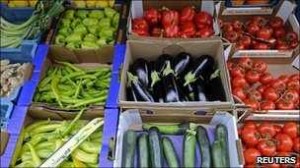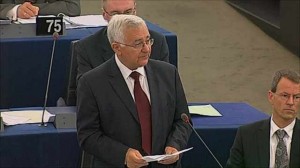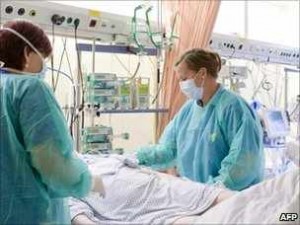Germany’s health minister says new E. coli infections from a deadly outbreak are dropping significantly and the worst of the illness is over.
Daniel Bahr said he was cautiously optimistic the outbreak had peaked, but warned that more deaths were expected as new cases emerged each day.
The outbreak has so far left 24 dead, infected 2,400 and left hundreds with a complication that attacks the kidneys.
Germany has been criticised across Europe for its chaotic response.
Health authorities initially wrongly blamed Spanish cucumbers. Then an organic bean sprout farm in northern Germany – the centre of the outbreak – was thought to be responsible.
Scientists are still examining samples taken from the farm. While some of the samples have tested negative for the rare strain of enterohaemorrhagic E. coli (EHEC), the results of other tests are still pending and expected later on Wednesday.
Farmers across the continent have suffered hundreds of millions of euros of losses as fresh vegetables have been thrown away and sales and prices have slumped.
Earlier, the EU proposed 150m euros (£134m) of compensation for farmers.
But agriculture ministers said they wanted much more and that their producers of fruit and vegetables should be compensated for the full amount of their losses, estimated at up to 417m euros (£372m) a week.
‘Gradually improving’
Fresh cases of the new strain are still being reported every day, including 94 in Germany on Tuesday.
Mr Bahr told ARD television: “There will be new cases and unfortunately we have to expect more deaths but the number of new infections is dropping significantly.
“I cannot sound the all clear, but after analysing the latest data we have reasonable cause for hope. The worst of the illness is behind us.”
Under fire for its handling of the crisis both inside Germany and from the wider EU, Chancellor Angela Merkel’s government is holding an emergency summit in Berlin on Wednesday to assess the situation.
Mr Bahr will be joined at the meeting by Agriculture Minister Ilse Aigner, EU Health and Consumer Affairs Commissioner John Dalli, government representatives from each of Germany’s 16 states as well as health experts.
Critics argue there are too many different agencies involved and this has led to a bungled investigation, says the BBC’s Tristana Moore in Berlin.
The government is still warning consumers to avoid eating raw foods such as tomatoes, cucumbers, salad and bean sprouts.
Mr Dalli earlier warned Germany against issuing any more premature – and inaccurate – conclusions about the source of contaminated food. Information had to be scientifically sound and foolproof before it was made public, he said.
“It is crucial that national authorities do not rush to give information on the source of infection that is not proven by bacteriological analysis,” he told the European Parliament.
“This spreads unjustified fears [among] the population all over Europe and creates problems for our food producers.”
But Hamburg state’s senator for health, Cornelia Pruefer-Storcks, defended the local authorities’ decision to issue a warning about Spanish cucumbers at the beginning of the crisis.
“We had a different situation here in Hamburg when we put out the warning about Spanish cucumbers and removed them from the shelves,” she told a news conference.
“In two lab tests we had positive E. coli results, which were confirmed twice by the government laboratory and the EU laboratory, and so this was not a process of consideration but rather it was imperative.”
Ms Pruefer-Storcks also said that all test results so far on bean sprouts, which were thought on Sunday to be the source, had been inconclusive.
But she nevertheless said that clinics dealing with the outbreak had told “us that the situation is gradually improving”.
“We are seeing the first patients discharged, others are getting much better, so the first glimmers of hope are on the horizon.”
Germany’s national institution responsible for disease control and prevention, the Robert Koch Institute, said the number of new cases had declined, but added that it was not certain whether it would continue.
Meanwhile, Dr Guenael Rodier, director of communicable diseases at the World Health Organisation (WHO), said that if the origin of the infection was not identified soon it might never be found.
He told the Associated Press that the German investigation had been “erratic” but that solving such an outbreak was “not an impossible task”.
Source : BBC







































